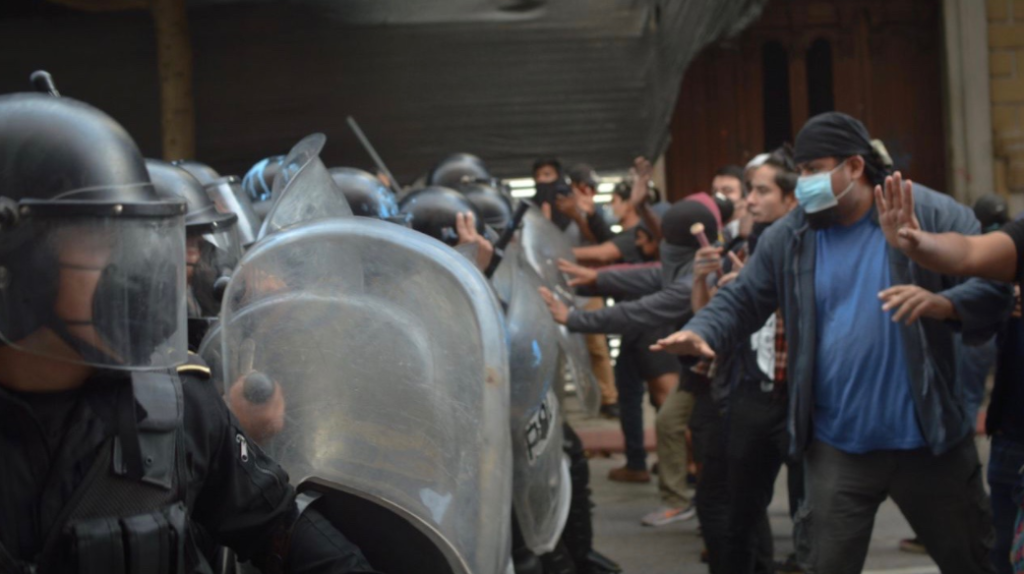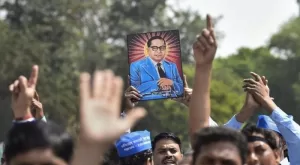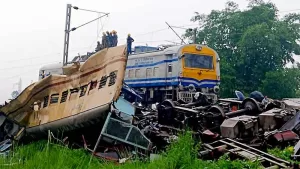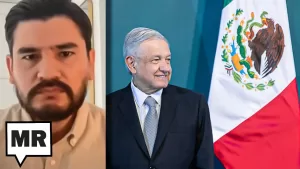[For the past several days, hundreds of thousands of people have taken to the streets in Guatemala against the corruption of the political elites. The protests were sparked by the approval of the 2021 budget which saw a massive decrease in funds allocated for the public health and education sectors while increasing funds towards ministries that have been implicated in corruption scandals.
The budget was the final straw after months of growing discontent in the Central American nation. The government of Alejandro Giammattei who took office in January 2020, has favored businesses over the people, which is evident in his administration’s mismanagement of both the pandemic and the natural disasters that hit the country in the last month.
This boiled over into the mass protests seen over the weekend in the capital, Guatemala City, as well as 15 other cities. The protesters demanded the resignation of the executive, members of congress and even members of the supreme court.
On Saturday, November 21 in the capital city, the national police unleashed violent repression against protesters. The police officials fired tear gas directly at the people, severely affecting hundreds and causing two to lose an eye. They also brutally beat the protesters and arrested more than 30 students, human rights activists and journalists.
During Saturday’s protests, a small group also set a part of the Congress building ablaze. The action received a lot of attention and has been used by sectors of the government to push a narrative according to which a destabilization plan is being executed and attacks are being made against democracy. On November 23, president Giammattei invoked the Charter of the Organization of American States in order to reestablish “democratic order” through a dialogue with different sectors. In a communique released on Monday calling for the invocation of the charter, the executive wrote, “The acts of systematic violence against national institutions, of which all Guatemalans have been witness to, do not represent legitimate ways to exercise freedom of expression. On the contrary, such acts are nothing more than a way that minority groups seek to force a true coup d’état.”
On Monday, Congress announced the suspension of the controversial budget. But the people have stayed on the streets. To understand the context within which these protests are taking place, as well as the demands from people’s movements, Peoples Dispatch spoke to Carlos Barrientos, a leader and founder of the Committee for Peasant Unity, an Indigenous and peasant organization in Guatemala.]
Peoples Dispatch: What happened on Saturday night?
Carlos Barrientos: On Saturday, there were a series of protests in the capital of Guatemala, as well as in 15 other cities. These mobilizations were sparked by the approval of a multi million quetzal budget late at night. The budget was approved hastily by the ruling bloc and its allies without discussion. It would have taken away funds to combat malnutrition in a country where 49% of children suffer from chronic malnutrition. It would have taken away funds from the health sector in the midst of a pandemic, and it allocated only a very small portion of funds for the vaccine when it would be available. The budget also took funds away from the protection of human rights while allocating resources for ministries that have been implicated in serious corruption cases.
The approval of the budget was the straw that broke the camel’s back. However these mobilizations are a result of the indignation that has been accumulating over the past couple of months.
PD: To understand the current protests, it is necessary to understand what has been happening in Guatemala for the past several years. Could you give us a brief overview?
CB: As you will remember, in 2015, there were protests against corruption that led to the resignation of the president [Otto Pérez Molina, who was a general during the civil war between 1960 and 1996] and the vice-president [Roxana Baldetti]. Both of them, as well as members of two previous governments, were investigated.
In 2015, a relatively unknown candidate, Jimmy Morales, was elected as president. He was the candidate of an extreme-right wing party [the National Convergence Front] which was created by former members of the military and is staunchly anti-insurgent. As happened with the previous regime, at the end of 2016 and the beginning of 2017, both the son and the brother of Morales were accused of corruption. Following this, the president, vice-president and the remaining members of his cabinet formed alliances with sectors that had also been accused of corruption. This included both businessmen, as well as politicians and judges who faced serious accusations of corruption.
Here in Guatemala, we call this the ‘Pact of the Corrupt’. Following this, the business elites allied with the politicians moved to set back the advances in ensuring justice [In January 2019, Jimmy Morales unilaterally ended the mandate of International Commission against Impunity in Guatemala (CICIG) a UN-backed anti-corruption panel aimed at supporting the country’s judicial institutions in the fight against corruption and impunity]. A number of state bodies were co-opted by the appointment of corrupt individuals and those with questionable records.Then, last year, in the elections, Giammattei, a right-wing politician who had been participating in electoral processes for 20 years but had never won, managed to triumph.
PD: Alejandro Giammattei took office in January 2020. What happened under his rule that laid the ground for the protests over the weekend?
CB: It was already known that Giammattei was someone from the authoritarian right and that he was going to continue the plans of the pact of the corrupt. He had actually announced a fresh pact of the corrupt when the pandemic hit.
In the beginning, both the executive and the congress approved large budgets to fight the pandemic. The executive also implemented a series of quarantine restrictions to tackle the pandemic but these measures were relaxed as the business sector began applying pressure.
As the months passed, it was clear that there was a complete lack of adequate response. Instead, the response was completely improvised. Health care professionals were sent to emergency campaign hospitals and worked for months without pay. These hospitals also lacked medicine and supplies. People began to ask what happened to the money that had been allocated to fight the pandemic.
Additionally, reports began to surface of corruption in the ministry of health. In fact, the minister of health who had taken office alongside the president was fired. Later, other members of the ministerial team were implicated in corruption cases. All of this started causing deep indignation, but due to the fear of the pandemic, the people did not take to the streets.
Some weeks ago, some suitcases were discovered in a house. These had 122 million quetzales that apparently belonged to a minister of the previous government José Benito. This caused great unrest as it was an obvious instance of politicians getting rich by illicitly appropriating the resources of the Guatemalan people. Later, the two hurricanes – Eta and Iota – hit the country as tropical storms. These storms hit us towards the end of the winter rainy season and several rivers overflowed. Landslides occurred and tens of thousands of people were affected.
The government did not respond appropriately. Even though they knew that the hurricane was coming, they did not evacuate people or set up shelters. The response was totally inefficient.
Thus, the anger and discontent was building up and when the budget was approved, the indignation surfaced and various sectors and organizations gave the call to mobilize. And then, we saw the massive protests of Saturday – 500,000 people gathered in Guatemala City alone and many more took to the streets in 15 cities across the country.
On Saturday night, protesters were heavily repressed following the burning of a part of Congress in Guatemala City. For us, this action which has received a lot of attention, can be understood on one hand as a premeditated action of infiltrators but converging with the anger of the people on the streets that see Congress as the expression of total corruption. However, people quickly withdrew and the fire was put out. About thirty minutes later, riot police arrived and began to attack those who were protesting peacefully in the areas around Congress and in the Central Plaza. Protesters were also attacked in two other cities.
These developments have only made the people angrier. They are calling for the resignation of the executive and the ‘purifying’ of the Congress, as well the resignation of the Supreme Court, all of which are under the control of the corrupt sections.
PD: Could you tell us a bit about the nature of corruption in Guatemala?
CB: In our country, as in many others on the continent, corruption is not something involving just a few individuals. Instead, it is structural. It allows the political system to continue in its current form wherein business elites appropriate resources. This is done through structural corruption and even violation of national legislation. There are also many people who see the state as loot to be plundered. Thus, they contest for office not to fulfill promises or provide services but to get as wealthy as possible through this model of fictitious democracy. For this, they impose a neoliberal aggressive extractivist model which has allowed the unfettered growth of corruption.
Corruption does not end only with the resignation of some people, but with the transformation of the system. That is why a key argument made over the past few days has been that it is not enough to veto next year’s budget. There has to be systemic change. Some sectors among protesters believe that it is necessary to propose a Plurinational Assembly of Indigenous Power. These are some of the demands which accompany the call for the resignation of the president, vice-president, deputies of Congress and the judicial arm.
It is important to point out that there are clearly fractures within the government. Four days ago the vice-president called on the president to also resign, saying that he would not step down alone. In case both of them do resign, Congress will decide who takes over. But this Congress is dominated by the ruling party and its allies who are part of the pact of the corrupt. Thus, it is unlikely that there will be a quick solution to the crisis experienced in the country. Most likely, the mobilizations will continue. There is a lot of rage on the streets of Guatemala.
(Zoe PC is a journalist and reports on people’s movements in Latin America. She is also associated with Congreso de los Pueblos in Colombia. Article courtesy: Peoples Dispatch.)




